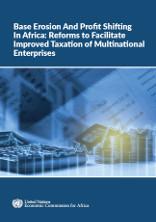Base erosion and profit shifting in Africa: reforms to facilitate improved taxation of multinational enterprises

OECD takes the view that, if implemented, the Base Erosion and Profit Shifting Actions will better align the location of taxable profits with the location of economic activities and value creation and improve the information available to tax authorities to apply their tax laws effectively. While many developing countries are now trying to implement these measures, they are faced with not only the original impediments to curtailing tax avoidance and evasion, but also additional administrative impediments, as well as policy and regulation impediments, all of which pose challenges to implementing the base erosion and profit shifting package. Only 17 of the 54 African countries were actively engaged in deliberations pertaining to the OECD base erosion and profit shifting project and only 10 were able to find funding to attend negotiations as recently as the middle of March 2017. The focus of this study on base erosion and profit shifting in Africa and reforms to facilitate the improved taxation of multinational corporations is therefore appropriate and timely for a number of reasons. First, political and public pressure has been a catalyst for intervention, which could drive reform at the global level. This momentum is rare and should be leveraged by developing countries to ensure that they can pursue reforms with the support of the international community. Second, given that countries around the world are considering the actions that they need to implement in order to curtail base erosion and profit shifting, African countries that rely heavily on corporate tax as a means of domestic resource mobilization and whose tax bases are heavily affected by base erosion and profit shifting (Oguttu, 2015a) should take advantage of the initiatives and commitments from international organizations to support developing countries in funding capacity development (Organization for Economic Cooperation and Development, 2014). Lastly, given that the OECD project does not specifically focus on base erosion and profit shifting in developing countries, this report offers alternatives approach and policy recommendations that African countries can consider in curtailing base erosion and profit shifting issues that are pertinent to them.